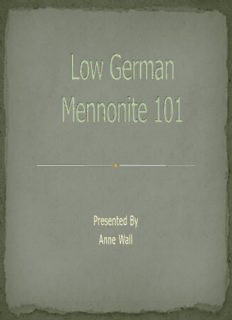
View workshop resources here. PDF
Preview View workshop resources here.
Presented By Anne Wall The opinions of this Mennonite do not necessarily ref lect that of the greater Mennonite Community Judaism Hinduism Muslim Baha’I Buddism Scientology Tao Christian- Catholic or Protestant Old Orders Conservative Conference Conservative Mennonite •Old Order Churches of of the Churches of Conference Amish Swiss Mennonite Mennonite Russian of Russian •Old Order Origin Church Mennonite Origin Mennonites •Conservative •Mennonite Origin •Evangelical •Waterloo- Mennonite Fellowship Conference of •Chortitzer Mennonite Markham •Conservative Eastern Canada Mennonite Mission Conference Mennonite Church of •Northwest Conference Conference •Beachy Amish Ontario Mennonite •Sommerfelder •Evangelical Church •Fellowship Churches Conference Mennonite Church Mennonite of Manitoba Conference •Midwest Mennonite Fellowship •Mennonite •Bergthalar •Evangelical Churches of Mennonite •Northern Light Conference of Saskatchewan Brethren Gospel Missions Canada Conference •Reinlander •Reformed Mennonites Mennonite Church •Church of God in •Other Conservative Christ, Mennonite •Old Colony Groups Church •Canadian Conference of Mennonite Brethren Churches Most Mennonite and Amish groups have common historical roots. Protestant Reformation (1525) Formation of a fellowship of Anabaptists (rebaptizers) Menno Simons, a Catholic priest Jacob Amman (1693) – his followers became known as “Amish” 1. Baptism: to baptize only those who place voluntary faith in Christ 2. Confrontation: to practice the discipline of confrontation leading to reconciliation or removal (as opposed to torture and execution) for those who hold opposing beliefs 3. Communion: to practice the Lord’s Supper in memory of Christ (not as a sacrament to receive God’s grace) 4. Separation: to be separate from the world of evil, sin and violence (including all Protestant and Catholic churches to the extent that they embrace the world) 5) Leadership: that Pastors (not priests) shall be chosen by local churches (not appointed by a dominating hierarchy) and will lead us as servants of the congregation 6) The Sword: to reject all violence, whether for attack, defense or punishment and to refuse employment by the state, who bears the sword outside of the perfection of Christ 7) The Oath: not to swear oaths of loyalty or word-keeping, which may be necessary for adversaries but not for brothers and sisters working together for common good Swiss-South German Dutch-North German Migrations since the 1920s Simply a label connected to one of our protestant leaders, Menno Simons Within the Mennonite faith there are many groupings It is important to know which group you are talking about
Description: